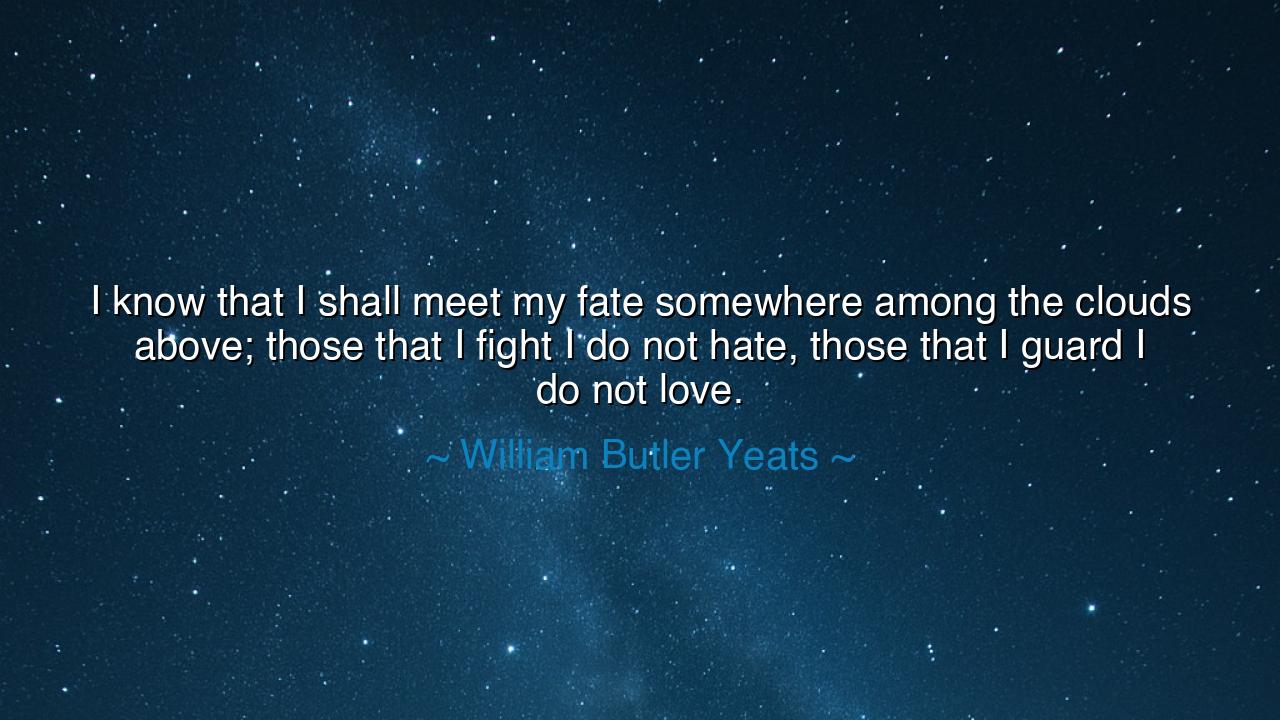
I know that I shall meet my fate somewhere among the clouds
I know that I shall meet my fate somewhere among the clouds above; those that I fight I do not hate, those that I guard I do not love.






“I know that I shall meet my fate somewhere among the clouds above; those that I fight I do not hate, those that I guard I do not love.” These words, solemn and eternal, were written by William Butler Yeats, yet they echo through the voice of Major Robert Gregory, the young Irish airman for whom Yeats composed his elegy, “An Irish Airman Foresees His Death.” In this verse, the poet speaks with the soul of a man who flies toward his destiny, knowing full well that death awaits him in the skies. Yet there is no hatred in his heart, no blind patriotism — only a quiet acceptance, a noble solitude, and a strange peace born from purpose.
The airman, like a figure from the old epics, stands between heaven and earth, between duty and detachment. He fights not for glory, nor for vengeance, nor even for the love of country. He does what he must — not because of hatred or love, but because the act itself completes his destiny. His is a tragic purity: the acceptance that fate does not always align with passion, and that one’s path may be walked in silence, with no reward but truth. Yeats, in channeling this voice, captures the essence of the lonely hero, one who faces death not in frenzy or despair, but in understanding.
Yeats wrote these lines during the Great War — a time when nations burned with propaganda, and men were told to die for causes they did not question. Yet the Irish airman, whom the poem immortalizes, feels no loyalty to kings or borders. “Those that I guard I do not love,” he confesses — for the people he protects are strangers to his heart, far removed from his own village of Kiltartan. And “those that I fight I do not hate,” for his enemies, too, are merely men caught in the same storm. He is a soul adrift in a world gone mad, fighting not for conquest but for meaning — for the rare, terrible beauty of doing what one must, even when one’s heart is weary.
In this, the airman stands among the ancients — like Achilles, who knew his fate before he sailed to Troy, yet chose to go, not for love of war but because the song of destiny called him. He walks the same path as Bhishma of the Mahabharata, who fought against those he cherished, bound by duty though his heart was torn. Such is the mark of true warriors and seekers — they move beyond the easy labels of good and evil, of love and hate. They act not from emotion but from the clear, burning light of inner necessity.
The airman’s courage is not loud; it is serene. His acceptance of fate is not resignation, but liberation. He no longer wrestles with the reasons of men — politics, nationalism, revenge — for he knows that life and death are but waves in the same sea. What matters is not whom he fights or protects, but the integrity of his soul in the face of destiny. Yeats reveals here the stillness at the heart of tragedy — that moment when the human spirit, standing at the edge of annihilation, transcends fear and claims eternity.
In this way, the poem becomes not only a lament for a single soldier but a meditation on the human condition itself. We all, in our own ways, are like that airman — soaring between purpose and futility, caught between the things we must do and the feelings we cannot summon. There comes a time when we must act, not because we hate or love, but because it is the next step on the road of truth. To live rightly is sometimes to live without reward, to walk forward even when no one understands why.
So, O children of the winds, take this lesson to heart: do what must be done, not for applause or vengeance, but because the doing itself is sacred. Let your actions flow from clarity, not from the chains of emotion. The world will tell you to hate your enemies and love your side — but wisdom lies beyond such walls. To fulfill your destiny is to rise, as the airman rose, among the clouds, calm in the face of fate, unshaken by praise or blame.
For in the end, Yeats and his airman teach us that the highest calling is not victory, nor loyalty, but truth — the unwavering courage to meet one’s fate with open eyes and a steady heart. When we live thus, neither hatred nor affection can bind us, and even in death, we shall be free.






AAdministratorAdministrator
Welcome, honored guests. Please leave a comment, we will respond soon